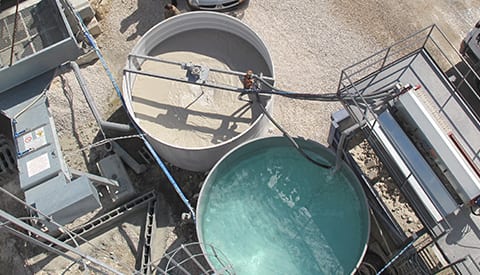What Should Be Done With Concrete And Washout Water?
Concrete and washout water are two of the most common types of waste generated on construction sites. Concrete is a durable material that is used in a wide variety of construction projects, but it can also be a significant source of pollution if it is not disposed of properly. Washout water is the water that is used to clean concrete tools and equipment, and it can contain a variety of pollutants, including cement, sand, and other debris.
Concrete Washout Recycling
One of the best ways to manage concrete and washout water is to recycle it. Concrete washout recycling can be done in a number of ways, but the most common method is to crush the hardened concrete and reuse it as aggregate in new concrete mixes. Concrete washout water can also be treated and reused in concrete mixes, but this process is more complex and expensive.
There are a number of benefits to recycling this washout water. First, it reduces the amount of waste that is sent to landfills. Second, it conserves natural resources, such as sand and gravel. Third, it can save money on construction costs.
How To Recycle
If you are interested in recycling, there are a few things you can do. First, you need to find a concrete recycling facility near you. Many concrete recycling facilities accept concrete washout water as well.
Once you have found a concrete recycling facility, you need to prepare the mixture for recycling. This may involve removing any large pieces of debris and screening the material. You may also need to add water to the washout water to make it easier to pump and transport.
Once the mixture is prepared, you can transport it to the concrete recycling facility. The concrete recycling facility will crush the concrete and process the washout water. The recycled concrete and washout water can then be used in new concrete mixes.
Filter Presses
Filter presses are a very effective way to treat concrete and washout water. They can produce a high-quality filtrate that can be reused or discharged. The solids produced by the filter press are also relatively dry, making them easy to dispose of or recycle. We’re partnered with Matec to provide the highest quality filter presses, learn more about them here.
Here are some of the benefits of using filter presses:
- Water conservation: Filter presses can help to conserve water by recycling it for reuse in the concrete production process.
- Environmental protection: Filter presses can help to protect the environment by preventing cementitious solids from being discharged to sewers or waterways.
- Cost savings: Filter presses can help to save money on water and disposal costs.
Other Options For Disposing
If you are unable to recycle, there are a few other options for disposing it. One option is to dispose of it in a landfill. However, this is not the most environmentally friendly option, and it may be expensive.
Another option is to dispose it in a sanitary sewer. However, this is only allowed in some areas, and you may need to obtain a permit from the local sewer authority.
Finally, you can also dispose the mixture on-site. However, this is only allowed if you have a permit from the local environmental agency.
Conclusion
The best way to manage concrete and washout water is to recycle it. Using Matec products are the most effective way to recycle concrete washout. It is important to choose the option that is most appropriate for your situation and that complies with all applicable laws and regulations. If you need help selecting a product to meet your needs contact us today!
About The Author
Nick Piskura is the Marketing and Web Development Specialist at ChemREADY who utilizes expertise in digital marketing strategies to provide knowledgeable insights in each segment of our business. Nick provides insights through web development and multimedia resources that support ChemREADY’s full range of services, including Legionella management, ANSI/AAMI ST108 compliance, boiler and cooling tower treatment, wastewater processing, and industrial water quality solutions.

